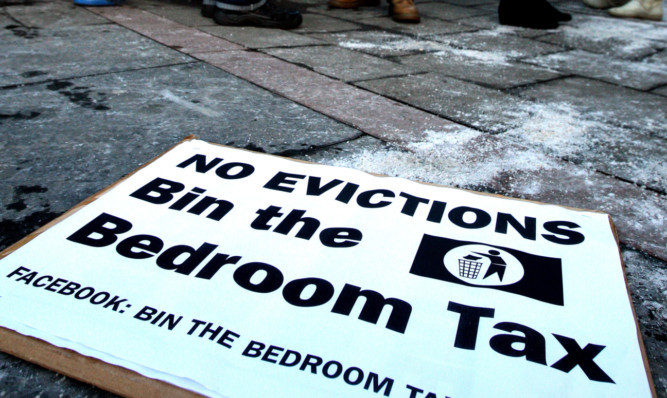Fifers have been urged to get behind the campaign to scrap the “inhumane” so-called bedroom tax.
The call by Fife Council leader Alex Rowley came as it emerged the local authority will not qualify for any of the £5 million set aside by the UK Government to help people affected by changes to housing benefit.
The additional funding announced by the Department of Work and Pensions last week is for those living in rural areas to ensure they are not disadvantaged disproportionately by the plans.
Fife will, however, be able to bid for a share of a further £20m allocation to Discretionary Housing Payments (DHP) to help those whose benefits have been cut.
Opposition politicians and anti-poverty groups have condemned the Government policy, which has seen social tenants with more bedrooms than they are deemed to need having their housing benefit reduced.
Those with one extra room have had their benefit cut by 14%, while those with two or more extra rooms have suffered a 25% cut.
Some 82,500 Scottish households are affected by the change, including 6,261 in Fife.
Mr Rowley said he is waiting to hear how the bidding process for additional DHPs would work and confirmed Fife had already received an additional £121,000, which can be topped up by £150% by the council, a move the authority is considering.
Although this will still not be enough to cover all the tenants whose benefits have been reduced, he said it would provide short-term support to those who could demonstrate a need for financial help.
“To date, the council has received 1,783 applications for Discretionary Housing Payment related to under-occupation and 1,140 tenants have been successful in their application for support,” he said.
“The amount awarded for under-occupancy is £243,167, which is based largely on providing support for a six-month period. The executive committee will consider a report on August 20 that proposes a DHP policy for Fife. If this is agreed, the council will extend the support in terms of the period covered and the level of support given to priority cases.”
Efforts are now being made to increase awareness of the fund to ensure those who need support can receive it.
Mr Rowley added: “We have cases where the council has spent tens of thousands of pounds adapting houses for disability and now the tenants are being told they should move, which would cost even more public money.
“The bottom line is: we do not have the houses with fewer rooms to accommodate every household that is deemed to have too many bedrooms. I wonder what kind of society we live in that our Government can target people on low income and tell them they can no longer live in a two-bedroom house if they are a couple and must move to a one-bedroom house or pay a penalty that will drive them into even more hardship.”
He pointed out people with a disability may need a room to themselves, adding: “Couples have their family, grandchildren coming to stay, divorced parents can have access to children and, for some couples, they may not always sleep in the same room, but this policy is telling all those people based on the fact they are on low incomes they cannot have two bedrooms.
“We don’t need bits of money to soften the blow, we need recognition that we do not have the houses and recognition that this policy is a direct attack on the poorest and their families and is driving people into even greater hardship.
“The bedroom tax must be scrapped and I hope people will join the campaign and stand up against this inhumane policy”.
